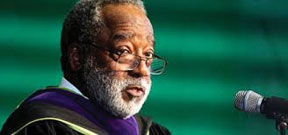
fighter leaves worldly legacy
By Derek Joy
Few, if any, will challenge the legacy of Nelson Mandela, who died last week at age 95.
Imprisoned for 27 years as a political prisoner for his role as a freedom fighter for human rights and human dignity for people of color, Mandela fashioned a legacy devoid of hate for his oppressors.
His life, as well as his legacy, includes resounding impacts not only in the international community, but here in South Florida.
Mandela’s April 27, 1992 visit to Miami was met with shocking disrespect by Cuban American elected officials and the Cuban American community as a whole. They refused to honor Mandela with the usual proclamations and key to the City commonly given to world leaders and statesmen.
That proved to be the catalyst for prominent Black American Attorney H. T. Smith to organize a tourism boycott that lasted three years and resulted in loss tourism revenues of some $100-million.
“Hopefully, his passing will cause people to pause to consider the values he instilled in people of the world,” said Smith. “I hope it will cause people to consider how he lived his life fighting for freedom, justice and the spirit of forgiveness of his oppressors.
“He taught us those lessons. Teachers can teach, but students have to learn. We had already had three destructive riots here. They didn’t solve the problem. It was up to us as trained leaders to find an effective alternative to violence.
“Mandela taught us that. He gave us that effective alter-native to violence that we had been looking for. That’s why we called it the ‘Quiet Riot.’ The economic losses brought the political and business leaders to the table. Money talks.”
According to Smith, the Miami Herald published an article after the first year of the tourism boycott that accounted for $58-million in loss revenues. Smith said not one Black Convention was held in Miami or Miami Beach during the three year boycott.
Whites also hesitated to visit en masse or book conventions in Miami Dade County. And the economic losses mounted.
Hence, economic losses forced local leaders and the Cuban American community to acquiesce.
“The tourism boycott we called the ’Quiet Riot’ caused the masses to pay attention to our demands for respect, justice and economic gains,” said Smith, who cited a long list of progressive actions that benefited Black Americans.
“The boycott was behind single member districts in the city of Miami, Miami Dade County and the Miami Dade Public Schools. It also was be-hind the three Congressional Districts that Blacks represent.”
Smith also noted entrepreneurial gains such as Robert Johnson, a Black hotel developer and Andy Ingraham, president and chief executiveofficer of the National Association of Black Hotel Owners and Operators, among others.
There was also the creation of the “In Roads Program,” which places Black college stu-dents in internships with For-tune 500 companies, many of whom are then hired by those companies.
“The whole world saw and understood how America, En-gland and most of the countries in Europe sided with the Apartheid world. For Mandela to have denounced Castro would have been an affront to those who supported his fight for freedom,” Smith explained.
Then Libyan Dictator Col. Muammar Gaddafi, Palestinian Leader Yasser Arafat and Cuban Dictator Fidel Castro had offered their support of Mandela in his fight against Apartheid.
That prompted then Miami Mayor Xavier Suarez, who is now a Miami Dade County Com-missioner and Miami Dade County Mayor Stephen Clark to join with five other Cuban American mayors to denounce Mandela’s support of Castro, even though he had been oppressed and imprisoned as Castro had reportedly done in Cuba.
Suarez later saw the error of his ways and apologized. Alex Penelas became Miami Dade County Mayor and promptly set about righting the wrongs Mandela suffered in Miami and Miami Dade County.
“Let’s face it. Cuban Americans are the majority now. If Miami fails it’ll be a failure on their watch. It would benefit them to build the successful ’’Rainbow City’ that Mandela fought for.
“Hopefully, there will be Cu-ban American voices heard in their world. There are some Cuban Americans who know that. They know Mandela’s greatest legacy shows that he was a bigger man than his oppressors.”
